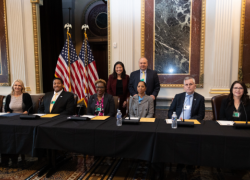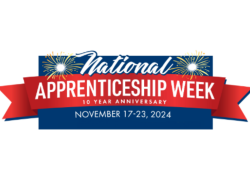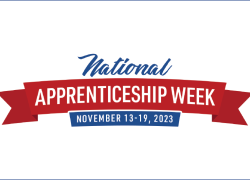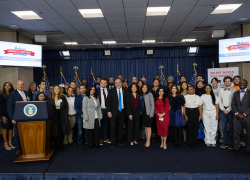
Purpose of National Disability Employment Awareness Month
Every year, National Disability Employment Awareness Month (NDEAM), overseen by the department’s Office of Disability Employment Policy (ODEP), recognizes and honors the achievements of workers with disabilities across the nation and highlights how inclusive policies and practices benefit both employees and employers. NDEAM also serves to bring attention to the challenges faced by disabled people, fostering greater understanding and promoting inclusion and equality.
The U.S. Centers for Disease Control and Prevention (CDC) estimates that roughly one in four adults – or 27 percent – have some form of a disability.
The theme of NDEAM this year is “Access to Good Jobs for All,” which champions increasing both the quantity and quality of job opportunities available to individuals with disabilities.
The Good Jobs Initiative, led by the Department of Labor, is focused on providing critical information to workers, employers, and government as they work to improve job quality and create access to good jobs free from discrimination and harassment for all working people.
Registered Apprenticeship (RA) programs align perfectly with this year’s NDEAM theme. They’re industry-driven, tailored to meet the specific needs of employers and offer workers a direct route to high-paying, good jobs. For all people, including people with disabilities, Registered Apprenticeships provide a clear pathway to financial independence.
Employers involved in RA programs are typically more aware of their obligations under the law and foster a more inclusive work environment, according to the findings from the American Apprenticeship Initiative Evaluation. The direct link apprenticeships provide between employers and potential employees allows for better understanding of individual needs and preferences. This can include flexible work hours, modified tasks, or specialized training methods that cater to different learning styles.
Disability inclusion ensures that individuals with disabilities have equitable opportunities to engage in all sectors of community life, including education and employment. This requires inclusive programs, accessible environments policies and in some cases reasonable accommodations.
The accommodations disabled workers may need, if any, are often easy to implement and cost less than employers think. In a survey conducted by the Job Accommodations Network (JAN), they learned that workplace accommodations are not only typically low in cost, but also positively impact the workplace in many ways.
Call to Action
NDEAM reminds us to support policies and initiatives that promote inclusivity in the workplace, such as developing inclusive Registered Apprenticeships.
Consider these actions to promote NDEAM’s mission of enhancing job prospects for people with disabilities.
- Join the celebration of NDEAM by planning an activity in your workplace. Check out NDEAM activities on the DOL website for inspiration and resources.
- Learn how you can develop an Inclusive Registered Apprenticeship program.
- Find out how you can get involved in National Apprenticeship week on apprenticeship.gov and check out our DOL blog. This year, we’re celebrating the 10th annual National Apprenticeship Week! This weeklong celebration helps us showcase the value of Registered Apprenticeship in developing a highly skilled workforce that meets industry needs, creating pathways for career seekers to catapult into good jobs, advancing racial and gender equity, and strengthening our economy.
- Reach out to the Job Accommodation Network (JAN) for free, expert, and confidential guidance on job accommodations and disability employment issues (AskJan.org)
- Start or maintain a disability-focused Employee Resource Group (ERG) in your workplace. This toolkit offers information on how to start.
John Ladd is the administrator for the Office of Apprenticeship in the U.S. Department of Labor’s Employment and Training Administration.

 U.S. Department of Labor Blog
U.S. Department of Labor Blog



